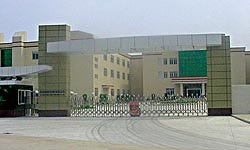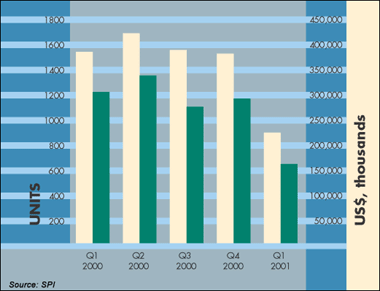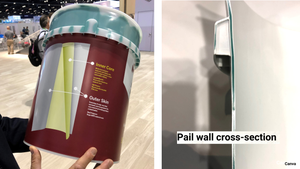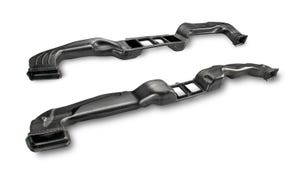Industry Watch 17028
August 1, 2001
Sluggish machinery sales data reflect industry-wide slowdown
Not surprisingly, new data released by the Society of the Plastics Industry (SPI) show a sharp drop in U.S. thermoplastic molding machine shipments from Q4 2000 to Q1 2001. The steep decline marked a departure from the relatively stable numbers of 2000.
Total shipment dollar values plummeted 45 percent from $297 million for the fourth quarter to $162 million for the first quarter. Total units fell from 1566 to 908, a decline of 42 percent. Similarly, new orders for auxiliary equipment dropped 34 percent from Q1 2000 to Q1 2001, and 11 percent from Q4 2000 to Q1 2001.
U.S. injection molding machine shipments
|
As expected, data from the first quarter of 2001 show a sharp decline in machine shipments, according to the SPI. Total shipment dollar values fell 45 percent from Q4 2000, and total unit shipments declined 42 percent. |
This information was released by SPI's Committee on Equipment Statistics (CES), which, after a four-year hiatus, has resumed the public disclosure of shipment and sales statistics, albeit gloomy ones.
SPI halted the release of machine statistics in 1997 due to a litany of problems, including anemic participation, flawed reporting methods employed by the U.S. Customs Service, and discrepancies in how participating manufacturers reported data.
Lori Anderson, SPI's director of economic and international affairs, took over the troubled program in January 1999 and has overseen many changes that she hopes will create a reliable source for such statistics.
"All the surveys and definitions were revised," Anderson says. "We had to make sure apples were apples; that if I'm reporting data and you're reporting data, we report it similarly. An exhaustive effort was made to go through all the definitions and make sure everything was very clear."
An exhaustive effort was also made to increase manufacturer participation.
The number of participating manufacturers and importers of injection molding machines now stands at 28, and according to Anderson, doesn't need to grow.
"For the first time in the recorded history of the program—and statistics have been kept here for some 20 years—not one company was suggested to be added to the program," she says.
Anderson reports that having the vast majority of injection machinery manufacturers in its ranks makes problems with government data less of an issue.
"When you have almost 100 percent of the companies reporting, it doesn't matter what the Customs Service says to a certain extent," she says. "The better the shape that SPI's program is in, the less a factor government data plays."
Tim Glassburn, vp of Toshiba Machine Co. of America, was a member of the ad hoc committee at SPI that restructured the program. "We got together and said, 'If it's not any good let's tear it apart and start all over again,'" he says, "and that's basically what we did."
Glassburn is happy with the new program, but obviously less enthusiastic about the numbers. "This is kind of new data so it's a little more difficult to interpret," he explains, "but I think all the manufacturers have felt a major slowdown in their order status."
Despite the grim picture painted by the latest data, the report is optimistic about the future and predicts steady growth for later in 2001 and all of 2002.
"We definitely expect, as the government seems to expect, that the economy will recover in the last part of the year," Glassburn says, "and shortly after, we hope the molding machine business does the same."
2000 U.S. machine shipments summary by tonnage, US$, thousands
| 0-299 tons | 300-999 tons | 1000+ | Totals |
| Units | Dollars | Units | Dollars |
Q1 | 988 | $103,254 | 490 | $142,445 |
Q2 | 1069 | $118,296 | 537 | $148,577 |
Q3 | 1065 | $110,225 | 452 | $119,613 |
Q4 | 1054 | $113,188 | 425 | $115,818 |
Totals | 4176 | $444,963 | 1904 | $526,453 |
Source: SPI |
Orient Express: Setting up offshore operations
 After two years of experimentation, CMI Engineering (Lebanon, IN) thinks it has discovered the formula for successful offshore operations, and like any other formula, chemistry plays a huge role.
After two years of experimentation, CMI Engineering (Lebanon, IN) thinks it has discovered the formula for successful offshore operations, and like any other formula, chemistry plays a huge role.
"When we find someone we're comfortable with, we'll look at forming a partnership or we'll buy into their operations," CMI General Manager Bob Ritchie says. "It's just a matter of finding something comfortable. We use different shops, talk to different people, and see how the relationships work out until a partnership occurs."
Using this method, CMI has completed three expansions. In the largest maneuver, it courted China's Zheng Plastics Corp. as a partner in a new 800,000-sq-ft tooling shop slated to open this month in Dong Guan, China. Called CMI Asia, the QS 9000-certified facility will employ 1500 people and operate more than 200 milling machines. It will primarily do production tooling along with some prototype or rapid production tooling.
CMI Asia isn't the company's first foray into the Asian market, and Ritchie says that before it attempted anything on the scale of the Dong Guan facility, it took some lumps.
"We've gone through our fair share of horror stories," Ritchie says, "and paid our dues and spent a lot of money. We were running into places where the level of communication wasn't what it should be."
He says communicating is a key concern when considering offshore operations, and it's not simply language barriers.
"The best thing is to go over there in person and sit down with the people," Ritchie says. "You need to make sure you communicate very clearly and concisely what it is you're looking for, what your expectations are, and how you intend to communicate back and forth."
He says CMI representatives journey to China at least once every two months to ensure that line of communication remains open. Regular correspondence is key with one of CMI's other recent offshore expansions, a molding facility in Ningbo, China. The shop handles inexpensive jobs with an emphasis on quick turnarounds. CMI does extensive networking to locate good-quality local companies for the fast and economical outsourcing of jobs.
CMI's final expansion represents the application of these offshore ideals in the Western Hemisphere. The company recently opened an office in El Paso, TX dedicated to tapping the Mexican market for high-quality, low-cost mold and tool shops south of the border.
Outsourcing business to other companies while quality standards and deadlines loom can be a worrisome proposition, and perhaps doubly so when done on foreign soil, but Ritchie says one rule can save many headaches.
"Make sure [the offshore prospect] is focused in on one specific manufacturing capability and not trying to do everything. You get into some situations where people try to get into everything and not be an expert at one aspect but just kind of dabble. That's what we learned by getting knocked around."
GE's acquisition of Honeywell dead
A move that would have added nylon to GE's already formidable list of resins was killed in July by the European Commission. This marked the first time that European antitrust regulators have disallowed a transaction previously approved by their American counterparts. A possible monopolization in the aviation industry was cited as the primary reason for blocking the merger. Following the commission's announcement, Honeywell CEO Michael Bonsignore announced his retirement. GE chair and CEO Jack Welch will retire by year's end; he remained on largely to oversee the attempted merger. GE's Board of Directors has named Jeff Immelt as his successor.
Apax acquires MPM, Netstal splits off
No sooner had the world's largest plastics machinery conglomerate been sold than it began to get smaller. Less than a week after purchasing Mannesmann Plastics Machinery AG (MPM) from Siemens for an undisclosed amount, Apax Partners & Co. Ventures Ltd. (London) sold one of its subsidiaries. Christoph Blocher purchased Swiss machine maker Netstal-Maschinen AG from Apax for an estimated $278 million. Blocher, Netstal's former chairman, reportedly made the move to continue to develop Netstal as an independent Swiss enterprise.
ERP and e-commerce: Together at last
Molders who purchase materials at online resin marketplace Omnexus and use IQMS EnterpriseIQ software could soon benefit from a new ERP-to-ERP connection that will use IQMS's enterprise resource planning software to automatically update supply chain data. Currently in beta testing with a tentative Q3 2001 launch date, the program's creators say it represents a breakthrough in B2B e-commerce.
It could represent a boon to the more than 20 global suppliers currently signed on at Omnexus if EnterpriseIQ users transfer their $1.5 billion in annual raw materials purchases to the plastics e-commerce site. The potential financial windfall is obvious to Omnexus suppliers who say any initial investment in the resin marketplace is outweighed by future potential created by this recent advance.
"For us to be electronically integrated into the ERP systems of hundreds of companies individually would have cost millions," says Kevin Cronin, Ticona's global e-business director. "The Omnexus-IQMS software alone could justify our original investment."
Omnexus and IQMS say the biggest benefits to users will be the seamless exchange of data between the molder's ERP system and the e-commerce site. Automatic updates to accounting, inventory, and other departments could eliminate the need to track data manually.
You May Also Like



